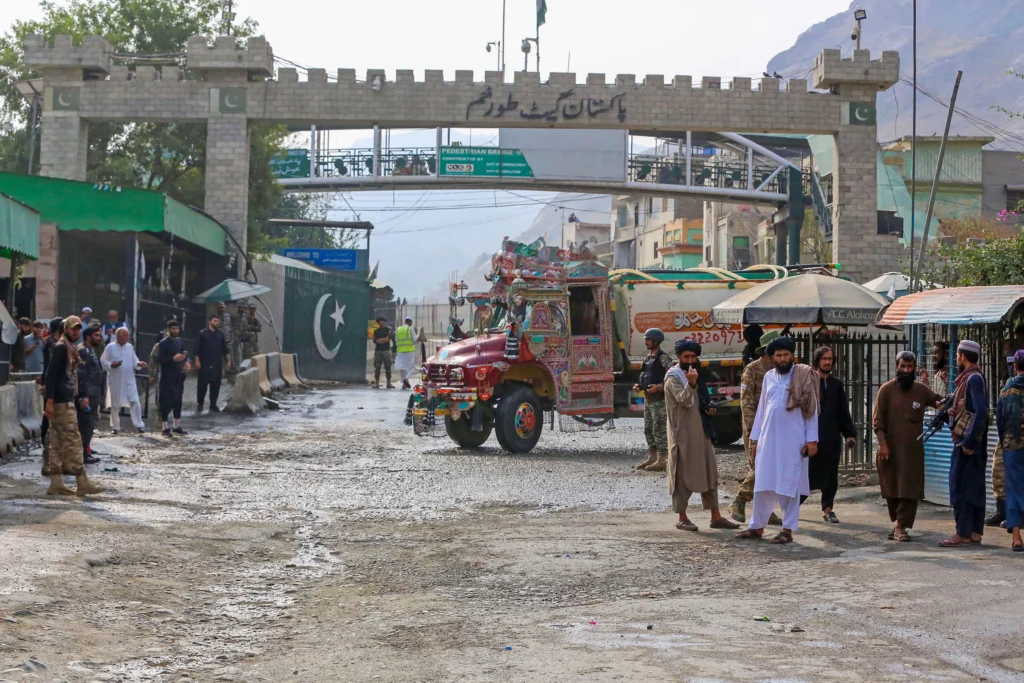A deepening economic crisis is unfolding between Afghanistan and Pakistan, threatening to unravel a trade relationship worth over a billion dollars annually. The developing Afghanistan-Pakistan Trade Collapse stems from a recent directive by Afghanistan’s Deputy Prime Minister for Economic Affairs, Mullah Abdul Ghani Baradar, urging Afghan traders to halt trade with Pakistan and find “alternative routes”. This move, which includes a three-month deadline to ban Pakistani pharmaceuticals, has been met with stark warnings from the Afghan business community, who fear catastrophic economic consequences.
Kabul’s push for new corridors via Central Asian nations like Uzbekistan, Tajikistan, and Turkmenistan is a bid to reduce its economic dependency. The administration has framed the Pakistani route as “high-risk”, citing significant losses from repeated and unpredictable border closures. However, prominent business leaders, including Khan Jan Alkozai of the Afghanistan Chamber of Commerce and Investment (ACCI), have warned that a sudden halt without viable alternatives will lead to an economic “collapse”.
The Immediate Economic Fallout
The impact of the ongoing border closures has been immediate and severe, validating the concerns of the business community. Alkozai noted that traders on both sides are losing a combined $1 million daily. For landlocked Afghanistan, the consequences are acute. The halt has triggered price hikes for essential imported goods, including food and medicine. Simultaneously, it has devastated Afghan exporters.
With key crossings like Torkham and Chaman shut, hundreds of trucks laden with perishable goods such as grapes, tomatoes, and apples are reportedly stranded, their cargo spoiling before it can reach Pakistani markets. This disruption underscores the profound humanitarian and commercial stakes of the Afghanistan-Pakistan Trade Collapse.
Pakistan’s Security and Economic Perspective
Pakistan’s perspective is anchored in long-standing security and economic concerns. Officially, Pakistan has stated that the “core issue” in bilateral talks is security, specifically the use of Afghan soil for militant activities against it. These security issues have been the primary driver for the border closures.
Beyond security, Pakistan is also managing complex economic challenges associated with the Afghan Transit Trade (ATT). Pakistani officials have long been concerned that a significant portion of goods imported for Afghanistan under the transit agreement re-enters Pakistan’s markets illicitly. This smuggling is estimated to cost the national exchequer hundreds of millions, if not billions, of dollars annually.
Defence Minister Khawaja Asif’s comment that Afghanistan seeking other routes could be a “blessing in disguise” reflects this deep economic concern. From this perspective, a reduction in transit traffic is seen as a way to improve border management and protect Pakistan’s domestic economy from the impacts of illicit trade. This complex interplay of security and smuggling is a crucial factor in the Afghanistan-Pakistan Trade Collapse.
Economic Ripple Effects of the Afghanistan-Pakistan Trade Collapse
The economic fallout is not confined to one side of the border. The Afghanistan-Pakistan Trade Collapse has sent powerful shockwaves through Pakistan’s border provinces, Khyber Pakhtunkhwa (KP) and Balochistan, where local economies are heavily dependent on cross-border commerce. The Chaman Chamber of Commerce has reported “near-total unemployment”, while traders in KP have warned of “crippling losses” and widespread job cuts as thousands of laborers are rendered jobless.
Specific Pakistani export sectors are also facing significant challenges. The ban on Pakistani pharmaceuticals, for instance, jeopardizes a market worth nearly $200 million annually. Business groups like the Sarhad Chamber of Commerce and Industry (SCCI) have noted that the unstable trade environment has created an opportunity for regional competitors, with products from Iran and Central Asian states increasingly gaining market share in Afghanistan.
The Long-Term Pivot to New Corridors
Afghanistan’s pivot to new routes through Uzbekistan and Russia is not an overnight solution but a long-term strategic realignment. These “routes” primarily refer to ambitious, multi-billion-dollar infrastructure projects, most notably the Trans-Afghan Railway. This project aims to connect Central Asia’s rail networks with South Asia’s seaports. In a sign of long-term regional planning that transcends the current dispute, Uzbekistan, Afghanistan, and Pakistan signed an agreement in July 2025 to pursue a joint feasibility study for this railway. While this demonstrates a shared vision for future connectivity, it does not solve the immediate crisis.
For now, the Afghanistan-Pakistan Trade Collapse represents a fundamental test for both nations. Afghanistan is weighing the high cost of an immediate economic shock against its long-term goal of economic sovereignty. Pakistan, meanwhile, is balancing its critical security and economic integrity concerns against the significant commercial disruption in its border regions. The immediate victims are the traders, laborers, and civilians on both sides, caught in the middle of a complex geopolitical realignment.


